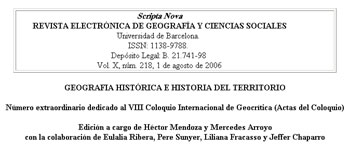Geography and History, tradition and modernity: fundamentals of contemporary geopolitics
Keywords:
borders, (bio)geopolitics, globalization, state, environmental complexityAbstract
This article is intended to account for the historical evolution of geopolitics of modern national states, in the light of the fundamentals imposed by geographical aspects of places they have conquered, considering the states conformation, the establishment of the statute of territorial domain -- sovereignty -- , and, particularly, the narrowing of relations between countries (planet “bits” states have historically annexed). Such analysis allows to demonstrate how complex that both the notion of territorial sovereignty and of state have gained, as well as to discuss the role played in this process by geographic-environmental foundations. The relationship of countries to the so-called environment issue and world patrimonies (cultural and natural goods, as defined by UNESCO) is briefly examined as a way of illustrating that process. By the same token, some terms of Antarctic Convention are examined. Several players and thinkers in the field of geographical analysis, both traditional and contemporary ones, are reviewed so as to confer consistency to the intended analysis, with an emphasis on formulations by F. Ratzel, F. Braudel, P. Veyne, M. Santos, O. Dollfus, E. Morin, E. Leff, and M. Foucault among others.Downloads
Published
2007-05-02
Issue
Section
Articles
License
Los autores que publican en esta revista están de acuerdo con los siguientes términos:
- Los autores conservan los derechos de autoría y otorgan a la revista el derecho de primera publicación, cin la obra disponible simultáneamente bajo una Licéncia de Atribución Compartir igual de Creative Commons que permite compartir la obra con terceros, siempre que estos reconozcan la autoría y la publicación inicial en esta revista.
- Los autores son libres de realizar acuerdos contractuales adicionales independientes para la distribución no exclusiva de la versió de la obra publicada en la revista (com por ejemplo la publicación en un repositorio institucional o en un libro), siempre que se reconozca la publicación inicial en esta revista.





